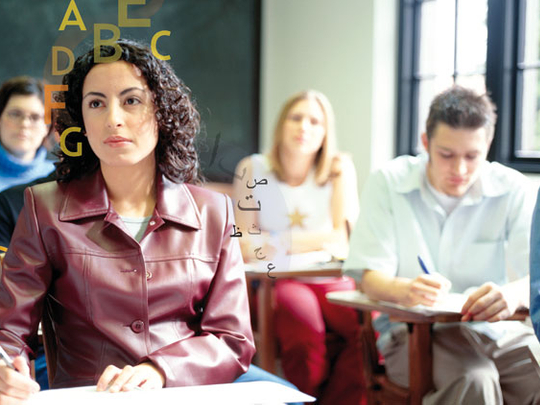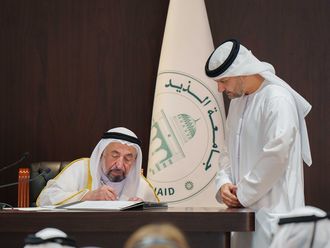
While universities in the UAE and the Ministry of Higher Education and Scientific Research are determined to have its graduates proficient in English, at what price does it come?
Research studies recently conducted by the American University of Sharjah (AUS) and UAE University show that using English as a medium of instruction is a threat to the Arabic language and Arab students' identity.
In a paper titled English in the Arab Gulf published in the Asian Journal of University Education, Dr Khawlah Ahmad from the Department of English at AUS explores the challenges of teaching in English, which is done from the primary school to the tertiary level.
"The language issue is causing a great deal of concern and posing many challenges because the official language of all Arab countries is Arabic. An important matter of concern here is Arab-Islamic identity, which many believe is at stake," Dr Khawlah says.
There is an ongoing debate worldwide on the teaching of English (where English is not the native language) around whether teaching English means teaching the culture that comes with it or including the culture of the students involved, Dr Khawlah adds. Dr Mohammad Adnan Al Ghorani at UAE University's Department of Psychology and Counselling is also exploring the same topic as part of an Emirates Foundation funded project.
"Language greatly affects the identity status of a person... it affects how they perceive themselves and that can lead to negative self esteem."
Negative impact
Al Ghorani explained that students' Arabic language proficiency is low and when they have to learn in English, where their proficiency is "well below average", it affects them in a negative manner.
Young Arabs are struggling with cultural identity, especially in homes where the children speak English more fluently than their mother tongue, but parents speak Arabic primarily.
"That has an impact on the parent-child interaction — they feel different from their parents and it affects the harmony [of the relationship]," said Al Ghorani. The push for English as the medium of instruction is not unique to the UAE. With globalisation, the emphasis has been increasingly placed on English and governments are restructuring their educational, economic and social policies to respond to international trends. In education, there is the race to continuously upgrade and prepare individuals for the work place.
Challenges
The challenge for Arab Gulf countries, says Ahmad, is how to meet various demands and also ensure that the type of learning responds effectively to the needs of individuals and countries without disrupting beliefs and traditions.
Arab Gulf countries, being members of the Arab League, are committed to cooperate educationally in the cause of "Arabisation", and to revive the intellectual and artistic legacy of the Arabs but this has not been fully realised in the Gulf, she said.
Furthermore, "Arabic is not just the official language, it is the language of the Quran…. And Islam is not just a religion but a way of life for those who follow it — an integral part of the culture and identity of its members."
Dr Khawlah said that in her experience of teaching students, they regard whatever is not emphasised as unimportant. The problems that arise include pidgin Arabic where students are unable to speak Arabic properly without introducing other widely-used languages into the vocabulary.
"Arabic researchers are looking into the 'pidginising' of Arabic and the loss of standards."
At AUS where Dr Khawlah teaches, English is the medium of instruction but some students struggle to express themselves in English and request to explain their ideas in Arabic.
"I understand what they are struggling and say ‘go ahead'.
"And why not? It takes a few words to explain something in Arabic than half an hour to explain something in English."
Dr Khawlah believes curriculum developers and governments should rethink the English language policy at universities while still ensuring that graduates are part of the global world.
Al Ghorani teaches students exclusively in English at the UAE University as per its policy.
"I tell students we have to stick to English because it is a regulation but I say, ‘I'm sorry I'm contaminating your identity'."
Al Ghorani believes that students don't need all of their education to be in English to succeed and advance in the work place.
He said that he taught students psychology in English but they struggled to apply their learning when their work environment is in an Arabic language setting.
Students divided
Zeena Farsee, an Iraqi student at AUS, is concerned that learning in English her entire life has caused her to be robbed of Arabic and being fluent in it.
"It's not just speaking at home but the standard Arabic and reading and writing that has been affected."
However, she points out that studying Arabic was never as fun as learning English and it wasn't something encouraged at her high school.
"In university I don't have to use it at all. There's a void and it's embarrassing that I don't speak Arabic as well as I should."
She acknowledges there is no middle ground as English is needed for everyday life but a symbiotic relationship could be achieved she said.
UAE national Alya Rasheed from Sharjah Women's College feels the opposite way.
She found it difficult to learn in English at first but says there are advantages to knowing the language.
She also says that Arabic literature is not as interesting as the wealth of media available in English.
She finds a happy medium speaking Arabic at home and English in the outside world. "You need English in college, in the shopping malls, when you travel and work. But I'm not losing my language."
Have your say
Is learning in the English language posing a threat to Arabic? What do you think whould be done to strike a balance?












